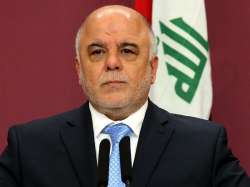Donald Trump to host Iraq PM Abadi at White House today
US President Donald Trump will host Iraqi Prime Minister Haider al-Abadi at the White House on Monday.

US President Donald Trump will host Iraqi Prime Minister Haider al-Abadi at the White House on Monday.
The meeting between Trump and Abadi may touch on some sensitive issues.
The Iraqi government had objected after its citizens were included on Trump’s travel ban in January which barred citizens from seven Muslim-majority to come into the United States.
The latest order has excluded Iraq from the ban following intensive lobbying from Baghdad at the highest levels, CNN reported.
Abadi held a phone call with Trump on February 10 to discuss the travel ban. He had also raised the issue in an in-person conversation with Vice President Mike Pence in Munich on February 18.
As he left Iraq for the US on Sunday, Abadi said Iraqi forces were close to ridding the country of the Islamic State (IS) and the battel in Mosul was "in its last stage."
"We are in the last chapter, the final stages to eliminate IS militarily in Iraq," he said in a video statement.
Iraqi troops have surrounded western Mosul and military leaders vow it's only a matter of time until they crush the last major stand of the Islamic State group in Iraq.
But the militants are positioning themselves to defend the remains of their so-called "caliphate" in Syria and wage an insurgent campaign in Iraq.
The extremists are carrying out what looks like an organised, fighting withdrawal: a core of fighters is holding out in the city using hundreds of thousands of civilians as shields, tying down and bleeding the Iraqi military in urban combat.
Abadi said he hoped the US and other allies would continue to offer economic assistance to Iraq, which he said faced a financial crisis as a result of the war against the militant group.
Trump last week announced a $54 billion increase in US defence spending.
If approved by the Congress, over $3 billion of the additional money would be allocated to the fight against the IS, including $2 billion for a flexible fund that would allow the Pentagon to decide how to utilise resources in support of the new counter-IS strategy.